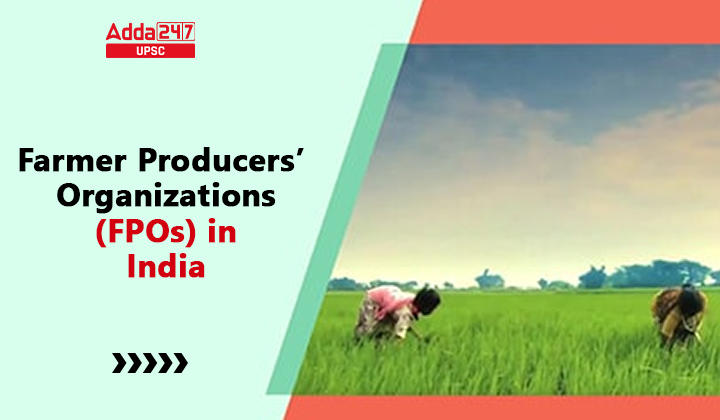Table of Contents
Farmer Producers’ Organizations (FPOs)
India, with its predominantly agrarian economy, has embarked on a mission to enhance farmers’ income and ensure sustainable development. This vision is realized through a multi-pronged strategy aimed at improving productivity, reducing costs, enhancing marketability, promoting crop diversification, mitigating risks, and adopting climate-resilient technologies.
Empowering Through Collective Action- FPOs Unveiled
At the heart of this strategy lies the concept of Farmer Producers’ Organizations (FPOs) or farmer-producer companies (FPCs). These entities are a collective of farmers who either own or work in a specific geographical cluster. FPOs can be registered under the Companies Act or as cooperatives under the Societies Registration Act. They have proven to be catalysts for cluster-based farming, delivering economies of scale in input management, enabling effective agricultural extension services, fostering technology adoption, ensuring quality assurance, and facilitating improved market access for farmers.
Countering Fragmented Holdings with FPOs
One of the most significant challenges faced by small-scale farmers in India is the fragmentation of land holdings. This issue severely hampers the adoption of modern agricultural practices, as individual farmers lack the resources and scale necessary to benefit from them. FPOs offer a solution to this problem by pooling resources, knowledge, and efforts.
By bringing together farmers within a geographical area, FPOs consolidate land and resources. This consolidation enables members to collectively invest in modern machinery, adopt advanced farming techniques, and purchase inputs in bulk, resulting in cost savings. The economies of scale achieved through FPOs ensure that even small-scale farmers can access resources that were previously beyond their reach.
Government Schemes and Initiatives for FPO Promotion
The Indian government has recognized the potential of FPOs in promoting rural prosperity and has implemented several schemes and initiatives to support their growth:
- Formation and Promotion: The government has actively encouraged the formation and promotion of FPOs by providing financial support, technical assistance, and capacity-building programs. This enables farmers to register their FPOs, develop the necessary infrastructure, and establish market linkages.
- Equity Infusion: To strengthen FPOs, the government provides equity infusion, allowing them to raise capital and expand their operations. This support ensures that FPOs have the financial backing required to invest in modern technology and agricultural practices.
- Market Access: Government initiatives facilitate market access for FPOs by connecting them with government procurement agencies, agri-business firms, and retail chains. This opens up opportunities for FPOs to sell their produce at competitive prices.
- Credit Support: FPOs are often provided with credit support through interest subvention schemes, making it easier for them to secure loans for agricultural investments.
- Training and Capacity Building: The government conducts training and capacity-building programs to enhance the management and technical skills of FPO members. This equips them with the knowledge needed to make informed decisions and run their organizations efficiently.
The Way Forward
The rise of FPOs in India represents a paradigm shift in agriculture. By empowering farmers to collectively address the challenges they face, these organizations are transforming the landscape of rural development. With continued government support, FPOs can play a pivotal role in achieving sustainable development, reducing poverty, ensuring social inclusion, and addressing the complexities of India’s diverse demographics.
In conclusion, Farmer Producers’ Organizations are emerging as the agents of prosperity, bridging the gap between fragmented land holdings and the promise of modern agriculture. As they continue to grow and thrive, the agricultural sector in India is poised for a brighter, more sustainable future, benefiting both the farmers and the nation as a whole.



 TSPSC Group 1 Question Paper 2024, Downl...
TSPSC Group 1 Question Paper 2024, Downl...
 TSPSC Group 1 Answer key 2024 Out, Downl...
TSPSC Group 1 Answer key 2024 Out, Downl...
 UPSC Prelims 2024 Question Paper, Downlo...
UPSC Prelims 2024 Question Paper, Downlo...




